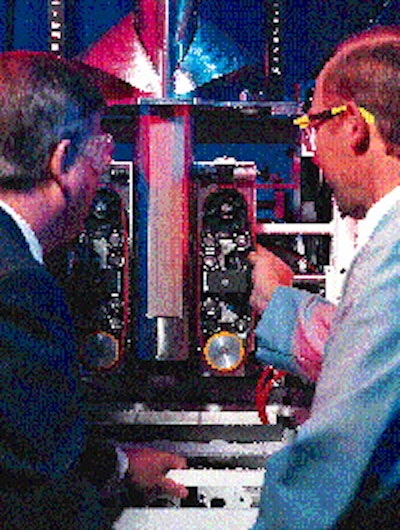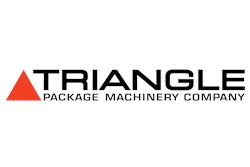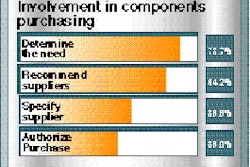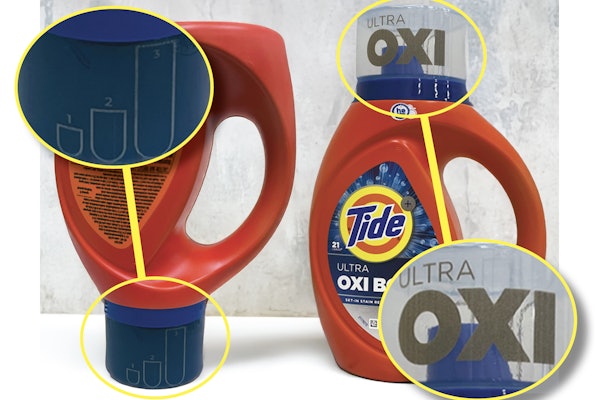If the movie "The Graduate" was being made today, the most memorable line of career advice to Benjamin might be changed to "the future is electronics." Not to take anything away from plastics, but when packaging gurus were quizzed about future skills for packaging mechanics, electronics and computers and their auxiliary knowledge areas were most frequently mentioned. If you're Nabisco or Anheuser-Busch or Frito-Lay, that's not exactly big news. If you're a smaller manufacturer, or an individual trying to get ahead in packaging, it could be helpful guidance. Electronics and computer controls are now being included in an increasing number of programs at vocational schools that train workers for employment as packaging mechanics. "We're finding that training in technical schools is really having to go backwards," says Glenn Davis, director of technical education for the Packaging Machinery Manufacturers Institute (Arlington, VA). "The schools are having to start at a far more elementary level than even just 15 years ago. That's because the basic skills--like knowing how to use handtools--aren't there in young people when they arrive at the schools." Davis and others point to both cultural changes and progress in product design that are driving young people away from understanding mechanical devices. Davis started out training auto mechanics many years ago. Today, he says, "I hardly raise the hood on my car." He fondly recalls the days when small kids would take apart their bicycles and later work on the motors of their first cars. They learned how to use handtools, generally from their fathers. This is no longer true in today's culture. Progress in product design has also played a role. In today's automobile, just like state-of-the-art packaging equipment, a computer is its most valuable component. Interpersonal skills also vital If electronics is the technical area that will be critical to packaging machinery mechanics of the future, Packaging World's experts explain that a variety of nontechnical skills will similarly be important. If you look at the list to the right, you'll see that some experts feel that the ability to work in teams, understanding how to work with management and other workers and problem-solving skills are the intuitive abilities that will make a packaging mechanic a more valuable employee as we begin the next century. As this special Packaging 2000 report ascends the ladder into packaging management positions, these intuitive abilities will obviously take on ever greater importance. But like a mechanic or machine operator on the plant floor, even managers will need to be knowledgeable about technical packaging issues whether they are machinery- or material- or regulatory- or management-related. In fact, some say the packaging mechanic's skills are in a time of transition. There are still plenty of machines that require relatively sophisticated tools to detach and affix change parts or to make adjustments. At the same time, the mechanical functions are all controlled by programmable electronics. Bob Patel, plant engineer at the Plainfield, IL, plant of United Distillers, echoes the need for a combination of mechanical and electronic knowledge. "The ability to handle both mechanical and electronic problems is a weakness now, mainly with the older generation," he says. "Companies looking to find mechanics are trying to find a person with both backgrounds. It's a major asset." The twin skills are important at Nabisco as well. Nancy Cobb, manager of human resource development at the company's Chicago plant, says the combination of skills is becoming essential. "There can't be an 'I'm a mechanic' or 'I'm an electrician' any longer. Mechanics have to learn the basics of troubleshooting electronics and control systems. This is a dramatic change in this type of job," she says. "When we train employees for a new line, we train the two together in the basics of PLC and operator interfaces. Later the electrician will go and do the PLC programming and the mechanics will go to the machine shop. But both must be comfortable in a close relationship." When PMMI's Glenn Davis rewrote that group's Manual on PLCs, he tells PW that it was deliberately written from the perspective of an experienced mechanic who doesn't know anything about computers. "We wanted this mechanic to be able to use a PLC after reading the book, the same way he'd be able to program his VCR at home--if he had a 14-year-old to help him!" Davis chides. Tech schools training Glenn Davis and PMMI, much like product manufacturers, often work closely with vocational schools to help develop courses that can train current packaging employees and those who are interested in packaging positions. Two that have similar programs are Wisconsin Indianhead Technical College, New Richmond, WI, and Dunwoody Institute in Minneapolis. Both schools have two-year degree programs for automated packaging technicians, and the graduates serve both product manufacturers as packaging mechanics and machinery builders as service technicians and equipment assemblers. Their courses range from basic machine shop and welding to machine logic system troubleshooting. There are introductory and advanced courses in AC/DC circuits, courses in blueprint reading and interpretation, microcomputer concepts and applications in packaging, and courses in electro-mechanical and power transmission components. In addition, a course in machine installation and set up is appropriate both for packaging maintenance mechanics and for machinery service technicians. Of the 50 different programming choices at Indianhead, one on systems control emphasizes the interface between electro-mechanical functions and programmable logic controllers (PLCs). Within it, says instructor Kevin Lipsky, students learn programming development, troubleshooting and hardware configuration for PLCs and microprocessors. Some training is done via simulation, while other applications involve full-scale equipment modification. The addition of a full machine shop and a welding fabrication area permit a student to observe manufacturing, and work with other students to solve packaging problems. "A team approach is used for the setup of new machinery brought into the shop," Lipsky says. "They learn to take a share of the responsibility and see the project divided into sections that use a shared time line." Cooperative training Virtually all the technical schools work in concert with the companies that employ their students. "We coordinate our courses with the companies that send us students," says Jay Hooper of Guilford Technical Community College (Jamestown, NC). "There are some skill areas they send people to our school to learn, but there are many other areas that they prefer to do training in-house, because of the proprietary nature of their equipment." Guilford works closely with a nearby Procter & Gamble plant. It teaches a course specifically for P&G packaging engineers who are new hires. "We give them the insight they'll need to be able to communicate with mechanics out on the plant floor," Hooper says. "The end result is we teach the mechanics, we teach the people who supervise the mechanics and we teach people who want to become mechanics." The two major areas at Guilford are a general knowledge of motor control and PLC operation. Courses go into standard ladder logic programming, often using trainers from Allen-Bradley (Milwaukee, WI) "because we want it taught in a generic fashion, and try to stay away from specific commands that only work with certain types of PLCs," Hooper explains. "We don't get into programming Boolean algebra or hexadecimal languages. We try to mimic what people will find in a manufacturing environment." The majority of Guilford's packaging students are part-timers who are not working toward a certificate but rather trying to learn specific skills. Keying on industry needs, Hooper says Guilford might offer the PLC course eight to 10 times a year, while equipment rigging and installation might only be offered twice. Hooper agrees with Davis that incoming students have less mechanical training than ever before. The upside, he says, is that most students come in with more computer exposure. "For people who are willing to learn equipment maintenance, those unafraid to get their hands dirty, this is a golden opportunity for them." More change For large manufacturers, equipment mechanics already must be versed in electronic controls and computers. At pharmaceutical giant Glaxo Wellcome, Research Triangle Park, NC, Bob Geer, director of production, sees an assimilation of skills. "The mechanic of the future will need some of the skills of the instrumentation technician," he says. At Glaxo, this is the person who normally looks after the wiring and electronics of the computer-age components in a machine or line. It's more than just understanding the electronics of individual machines. Mark Niemiec, vice president and director of packaging for Campbell Soup, Camden, NJ, sees packaging mechanics becoming similar to in-house line integrators. "They'll need to understand how machines in a line are linked. Is a conveyor feeding containers at the right speeds at control points throughout the line?" he asks. "Mechanics will need new tools and will have to know how to use them effectively," Niemiec continues. While he sees an increased need for technical training of mechanics, he says they won't necessarily need more higher education than today's mechanics. Owen Schweers, director of packaging at Perdue Farms, Salisbury, MD, says his company is just beginning to emphasize electronics with its mechanics. "Today, servos run the machines, so we're having to upgrade our mechanics accordingly. I think we're in the infancy of this process. "The trend to more sophisticated controls will only accelerate, so mechanics will need to increase their understanding of the computer controlling the line, the logic systems and algorithms used and software-driven diagnostic tools," adds Dan Goodwin, chairman of the Department of Packaging at Rochester Institute of Technology, Rochester, NY. Thinking and problem solving One of the most important nontechnical competencies that packagers will expect from mechanics of the future is problem solving. "The increasing automation and the ever increasing complexity of materials is making the challenge greater for those entering the packaging business today," says Indianhead's Kevin Lipsky. "Modern automation relies on large amounts of data. The ability to use this data to make sound decisions is important for all levels of employees." United Distillers' Bob Patel amplifies on the importance of sound decisions. "Pretty much all our packaging lines are now PLC-controlled. Our processing has been converted to PLC control. We've sped up our lines 60 percent, and our reliability and efficiency have jumped tremendously, thanks to about $1 million in new machinery. "To gain and to keep that efficiency, our mechanics have to handle sophisticated troubleshooting that requires logical thinking. This has become an extremely important aspect of these jobs already." Nabisco Biscuit's director of packaging development, Jim Scott, explains that this often involves not being afraid to get into the computer software and understanding how to change it effectively. The ability to communicate and to train others is another element identified by Dr. Kay Cooksey of the University of Wisconsin at Stout. Some mechanics may be so secretive about what they've learned about the PLCs, other shift people may be helpless. "If they aren't there, no one else can figure it out," she says. "Those with the knowledge need to be ready to train their contemporaries, rather than be secretive about their knowledge." This point brings up a whole raft of "people issues" that will be more completely covered as we describe the machine operator for the year 2000. These include understanding how to deal up and down the ladder with other employees, the ability to work in teams (as Lipsky mentioned) and understanding project management. Service technicians too Although PW editors asked the questions to reveal the skills and attributes needed by a packaging machinery mechanic in a manufacturing plant, many of those quoted above said that the same list would be appropriate for OEM (original equipment manufacturer) service technicians. In fact, many of the technical schools train technicians for machinery manufacturers in virtually the same ways. And for some of the same reasons. Some machinery service technicians, like their counterparts at customers' plants, are having a difficult time adapting from mechanical operation to modern-day electronics and computer controls. Representing a major buyer of equipment from OEMs, Nabisco's Scott confirms that some technicians are behind the times. "Some have older technicians who may have designed an earlier version of today's machines, and they're not always as up-to-date as we'd like," he says. "The most successful OEMs are conversant with the latest technology. But almost all companies still have machines that employ both older and modern processes." A funny story with more than a kernel of truth from Dan Goodwin of RIT should make all of us reflect. "In the factory of the future, I'm told there will be two employees, a man and a dog. The man's there to feed the dog, and the dog is there to make certain the man doesn't touch anything." That factory concept presupposes no need for maintenance, a concept no one PW interviewed predicts. If anything, the road from today to Goodwin's humorous future factory seems likely to be paved with the careers of countless packaging mechanics. "To gain and to keep that efficiency, our mechanics have to handle sophisticated troubleshooting that requires logical thinking. This has become an extremely important aspect of these jobs already." Bob Patel, United Distillers, Plainfield, IL






























